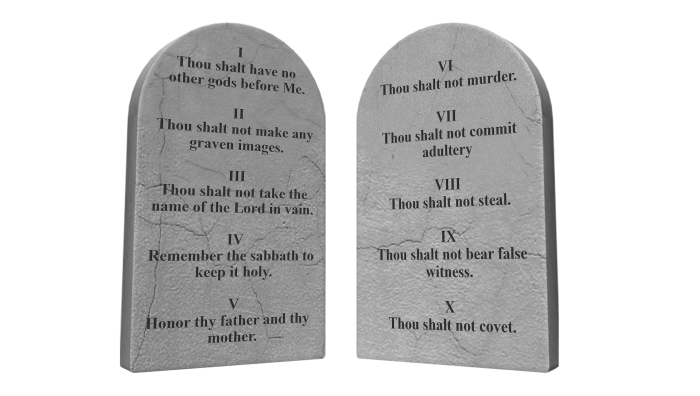Who is God? Some think especially of the holy God, Who judges everything that is not in accord with Him and overlays it with His wrath. Therefore, they think they can hardly meet His holy requirements. Others believe that God is love and therefore think they will be fine. In the end, for everyone, the issue is whether or not you will get into heaven.
We begin in the 10 Commandments to see how the Lord God introduces Himself there to His earthly people Israel. With that, we look a little further into the question of what God is actually like.
- All flavors can be found
- A breakdown of the ten commandments
- A wrathful God or a loving God?
- A new translation: the loving faithfulness
- Goodness belongs to God's eternal being
- The loving faithfulness of the Lord: God's love in action
- The secret of the righteous
- How do we arrive at the end of the journey preserved?
- Knowing God as your Father
- A Father who sets us apart
All flavors can be found
If you look around you in Christendom, you can discover all flavors; the extremes and everything in between.
Christians, extremely serious, who fear a wrathful God. Their lives, including Sunday church attendance, are marked by it. I once had a colleague who belonged to such a church community tell me in conversation that he was sure he was going to hell. He was not good enough. On the Bible stand someone once told me that I could think I was going to heaven, only to find out on my deathbed that I was terribly mistaken. Difficult conversations are those, because their image of God is deeply embedded in their souls.
At the other end of the Christian spectrum, there are Christians who only talk about God's love. According to them, the Old Testament does not belong, because the God of the Old Testament is not the God of the New Testament. In fact, you never hear them talk about many of the difficult portions in the New Testament either. Many difficult cautionary sections in the epistles and the judgments in Revelation, well that's not so appealing. Actually, Jesus is the only one who addresses them. A pastor I spoke to once told me that she herself did not believe in Christ's atoning work. But she said, they are beautiful stories that make people's lives a little lighter. A valuable example to follow and be inspired by.
As for themselves, they are convinced that things will soon be all right: God is love, right?
With both views you come out wrong. They are both one-sided and therefore un-Biblical. By the way, it is surprising that both extremes - both "images of God" - are mentioned side by side in the Ten Commandments, which is why we should explore this context further. So that we can get more and a better view of our "great God and Savior.
A breakdown of the ten commandments
Miraculously, God leads His people out of Egypt and through the Sea of Shell (Exodus 14). He judges Egypt and rescues His people from the land. They do not perish because they take refuge behind the blood of the lamb that they put on the doorposts. Then He still saves them from the Egyptians who come after them. Then, too, the Lord leads them through the water with which He then kills the enemies.

But then they have to make their way to the promised land and the Lord makes a covenant with His people. We find that account in Exodus 20 and we just have to read it as it says it. That's a little different from the way I used to have to recite it in school (a Reformed elementary school): 10 times you shall and you shall not. In which we probably always missed the most important thing.
About the gods and the Lord God
2 I am the LORD your God, Who led you out of the land of Egypt, out of the house of slavery. 3 You shall have no other gods before Me.
4 You shall not make for yourself an image, any image of what is above in heaven, or below on the earth, or in the water under the earth.
5 You shall not bow down to it, nor serve it; for I, the LORD your God, am an envious God, Who repays the crime of the fathers to the children, to the third and fourth generation of those who hate Me,
6 but Who does mercy to thousands of those who love Me and keep My commandments.
7 You shall not use the Name of the LORD your God in vain, for the LORD will not hold harmless whoever uses His Name in vain.
About the Sabbath
8 Remember the Sabbath day, that you sanctify it.
9 Six days you shall labor and do all your work,
10 but the seventh day is the Sabbath of the LORD your God. Then you shall not do any work, you, nor your son, nor your daughter, nor your servant, nor your servant, nor your cattle, nor your stranger who is within your gates.
11 For in six days the LORD made the heavens and the earth, the sea, and all that is in them, and he rested on the seventh day. Therefore the LORD blessed the Sabbath day, and sanctified it.
About life
12 Honor thy father and thy mother, that thy days may be lengthened in the land which the LORD thy God giveth thee.
13 You shall not kill. 14 You shall not commit adultery. 15 You shall not steal. 16 You shall not bear false witness against your neighbor.
17 You shall not covet your neighbor's house. You shall not covet your neighbor's wife, nor his servant, nor his servant, nor his ox, nor his donkey, nor anything that belongs to your neighbor.
The section contains three parts as indicated above. This does not mean that this is the only way to read this section, but it is the most meaningful for me at this time.
- The first part is about God: Who He is to His people and how He deals with those who go on to serve idols.
- verse 7 belongs to this first section. The word 'vain' denotes, for example, serving the Lord in vain; thinking you are serving the Lord, but it is empty and a lie. It is the result of idolatry and deception by the devil with his gods.
- 'Who void worship idols, forsaking Him Who is merciful to them. (Jonah 2:8). The word void (Strong H7723) used in this verse is the same as the word vain in Exodus 20:7. Incidentally, the same is true of the word void in Psalm 31: "I hate those who void worship idols. I trust in the Lord" (Psalm 31:7). And there are many more places that show that the word vain very often (depending on the context) has to do with idolatry. For example, also still in Malachi 3:14 ("serving God in idleness") and Zechariah 10:2 (false 'dreams' in relation to idolatry).
- Now when the text says not to use the Name of the Lord in vain, it means not to use God's name in a pagan, idolatrous way. In my opinion, this is the same as what the Lord Jesus says: "When you pray, do not use a repetition of words like the pagans, for they think that by the multitude of their words they will be heard. (Matthew 6:7). Repeating as a mantra one of the names of God or a deity - for example, the so-called Jesus prayer - is a way of opening up to the unseen world. See also here.



- The second part is about the Sabbath. We are not going to dig this out completely here but limit ourselves to the conjecture that keeping the Sabbath was to constantly remind the people that the Lord their God would complete the work. He would bring them safely into the promised land and they were to rest in that. They had to trust in that. He would do it, just as He had done everything in creation and rested. And just as He led them out of Egypt. They themselves could not contribute anything to it.
- The third part Is about the life they would lead in the desert. About their behavior, their visible deeds, but also about their lusts, that which goes on in their inner lives.
A wrathful God or a loving God?
In verses 5 and 6, the Lord names two sides of Himself: how He deals with those who hate Him and with those who love Him.
"I, the Lord your God, am an afterthought God, Who repays the crime of the fathers to the children, to the third and fourth generation of those who hate Me, but Who does mercy to thousands of those who love Me and keep My commandments." (Exodus 20:5-6)
We must properly discern here that these are two different things. One is that those who serve the gods are under God's wrath and will receive His judgment. And the other is that the others who trust in the Lord will experience His mercy and loving care for them. They trust Him because of what He has promised them, His covenant with them.
The former are called the wicked in the Old Testament. They are not people from the Gentiles, but people from the people of Israel, who think they are serving God, but meanwhile are serving idols. The second group is often referred to in the Old Testament as the righteous.
The entire Old Testament is full of this dichotomy within God's people and of how God deals with them. We must always keep this well discerned and, in addition, we must try to understand well what is meant by idolatry in the Bible.
Unfortunately, these two things are also problematic today:
- Unfortunately, most Christians do not understand what idolatry is - "it used to be, but not anymore, surely?
- God's wrath and judgment is unjustly applied to those who are "justified by faith. With harmful consequences, both on a personal level but also concerning entire communities.
A recent example of this was discussed last month. In that article is reported that, according to the newspaper's editor-in-chief, basically anything can be an idol to you. If that is so, then surely you can easily fall under God's judgment for such a thing? Then you cannot but live under constant grave fear that things might go wrong if you did or thought this or that.
But if you read something like this in the newspaper and think "What kind of nonsense is this?", you can also easily come to the conclusion that the whole Bible is really just nonsense and a relic of ancient religions without any relevance to our time. So that you just leave the Bible, the church and all that goes with it.
But when we understand what idolatry is, then we want nothing to do with anything to do with inner "god experiences. Then we want to entrust ourselves to the merciful, benevolent God, who has promised to bring you safely through life to your destination. We cannot experience Him internally, but He has shown how He led us out of Egypt and through the Sea of Shells. Moreover, He provided food, the quicksilver, the manna and even water from the rock. There is no reason not to take Him at His Word!
We know how it went with the people of Israel. They were faithless, did not trust the Lord and served idols. That's why they perished in the desert. The younger generation was allowed to enter the land, along with Joshua and Caleb. But the Lord God remains the same, and before they enter the land, Moses suggests the same thing to them a few more times (in Deuteronomy 5 and 7).

"Therefore you must know that the LORD is your God. He is God, the faithful God, Who keeps the covenant and mercy for those who love Him and keep His commandments, to a thousand generations. And He will retaliate to every one of those who hate Him, by causing him to perish, him personally; He will not hesitate toward him who hates Him. He will do retribution to him, to him personally." (Deuteronomy 7:9-10)
This text contains the word kindness, an Old Dutch word, which is unfortunately translated as mercy in Exodus 20:6. The original word [ or (Strong H2617)] is translated in most places as kindness. It is a word that is a little far from us, but incredibly meaningful.
A new translation: the loving faithfulness
For a few years now, a new Dutch Bible translation has been on the Internet under the name EBV. You can easily download it on your smartphone, tablet or computer. A print version will be available in the fall of 2023 DV: you can pre-subscribe here.
One of the great things about this translation is that the word kindness is translated in most cases as 'loving faithfulness'. Occasionally the translation is slightly different as, for example, 'loving friendship' in Genesis 32:10.
'Loving faithfulness' is a special translation because it tells me - and I suspect many of us - much more about Who our God is. No doubt it is also one of the Lord's attributes that is far too little brought into the limelight.
Often people - including Christians - see the Lord God as the "holy, wrathful and avenging God of the Old Testament." As a result, there is still hardly any room to see and admire His "loving faithfulness. We probably have far too little awareness that the Old Testament also speaks abundantly of God's loving faithfulness.
With the conversion of the old word "kindness" into "loving faithfulness," He comes closer to us, and I am glad of that. We will try to discover some of it.
Goodness belongs to God's eternal being
If you do a quick internet search for the meaning of the word benevolent, you can find that actually means that it is something of God's being, of His nature. It is Who He is in essence. So goodness is an essential characteristic of God. The God of the Bible is a God of loving faithfulness, He was, He is and He will be forever, as it says in Psalm 103:17:
But the loving faithfulness of the LORD
Psalm 103:17
Is from eternity and to eternity over those who fear Him.
Above Psalm 136, the HSV translation reads Eternal mercy.
Every verse in this Psalm is about that eternal goodness of the Lord. Every verse in this Psalm says something about the greatness of the Lord and about how His goodness is expressed. Every verse says something about His goodness toward man and especially toward His people Israel.
God's kindness is "not just" a creature characteristic, but He takes delight in showing that kindness, as is evident in the next verse:
"But let him who boasts boast that he understands and knows Me that I am the LORD.
Who proves mercy, does justice and righteousness on the earth,
For in these things I find joy, saith the LORD."
Jeremiah 9:24
This text also shows that the one who so knows the Lord has reason to glory in Him. Finally, the goodness of the Lord is cause for the believing Israelite to praise the Lord. So it is, for example, at the beginning and end of the same Psalm 136:
Praise the Lord, for He is good,
For His mercy is eternal.
Praise the God of gods,
For His mercy is eternal.
Praise the Lord of lords,
For His mercy is eternal.
…
Praise the God of heaven,
For His mercy is eternal.
Psalm 136:1-3, 26
If, as a believing Israelite, you knew the Lord and knew of His goodness, which He showed in all that He had done, then you had every reason to praise Him. If you knew Him in this way, then you could also trust Him to bring you safely and securely to the promised land. It was His goodness that you could rely on and which was reason to praise Him!
"It is good to praise the LORD and sing psalms to Your Name, Most High.
proclaim Your goodness in the morning and Your faithfulness in the nights"
Psalm 92:2-3
The loving faithfulness of the Lord: God's love in action
The word "kindness" appears often in the Bible. Here we will review some aspects of this loving faithfulness of God, without being able to be complete. You might say that loving faithfulness 'God's love in action' is. It concerns how God's love toward people and specifically toward His people is expressed. It is how He shows His love for His people.
- Everlasting.
"For the LORD is good, His goodness is forever, His faithfulness from generation to generation." (Psalm 100:5)
For example also: Psalm 106:1; 118-2-4; 136; Jeremiah 3:27; 1 Peter 2:3 - Great of patience, extremely patient (EBV)
"But You, Lord, are a merciful and gracious God, patient and rich in kindness and faithfulness (Psalm 86:15).
For example also: Exodus 34:6; Numbers 14:18; Psalm 103:8; Psalm 145:8; Jonah 4:2 Romans 2:4. - Merciful and genadig
"Lord, God, merciful and gracious, patient and rich in kindness and faithfulness" (Exodus 34:6)
"It is the goodness of the Lord that we have not perished, because His mercies have not ceased." (Lamentations 3:22-23)
For example also: 2 Chronicles 30:9; Nehemiah 9:31; Psalm 51:3; Psalm 77:10; Psalm 86:15; Psalm 103:8; Psalm 145:8. - Forgiveness of sins
"Be merciful to me, O God, according to Your goodness. DELETE MY TRUTH out according to Your great mercy." (Psalm 51:3-5)
"After all, You, Lord, are good, lenient to forgive and rich in mercy For all who call upon You." (Psalm 86:5)
For example also: Psalm 103:8-11; 130:4,7,8. - Salvation and salvation
"Let thy loving faithfulness Come unto me, O Lord, thy rescue As You have promised." (Psalm 119:41 EBV)
"However, I trust Your kindness, my heart will rejoice in Your salvation, I will sing to the LORD, because He has been good to me." (Psalm 13:6)
"You are the God of my salvation; (...) Remember Your mercy, LORD, and Your kindness, for they are from eternity." (Psalm 25:5-6)
"For Thy mercy Is great over me, You have given my soul to snatched from the depths of the grave." (Psalm 86:13)
For example also: Psalm 40:11; 69:14; 85:8; 98:3; 130:7; 149:4; Lamentations 3:22-23. - Comfort
"Yet let thy mercy be there to give me comfort, according to Your promise to Your servant." (Psalm 119:76) - Living, teaching and leading in life
"Make me live in accordance with your mercy; then I will observe the testimony of Your mouth." (Psalm 119:88)
"Do with Your servant according to Your mercy, and teach me thy ordinances." (Psalm 119:124)
For example also: Psalm 119:64; 143:8. - Help in the fight
"My merciful God will come to my aid, God will put me on my assailants cause to look down." (Psalm 59:11)
"He took us away from our opponents, because His mercy is forever." (Psalm 136:24)
For example also: Psalm 144:1-2
Many believers in the Old Testament knew the Lord this way and testified of His goodness. This is said of Abraham, but also of Job, Jacob and Joseph and many others. Actually, all who are set as examples to us in Hebrews 11 were believers who knew the Lord and trusted in His goodness. David also knew the Lord in this way and he is also the one who praised the Lord's mercy the most in the Psalms.
The secret of the righteous
By the way, for those who love God, keep His commandments and thus trust in Him, the question remains whether they can keep the remaining commandments. The answer to that is: no, they cannot. A few commandments a morally high-minded person may be able to keep, but when it comes to covetousness, anyone who knows his own heart will have to say that he falls rather short there.
Paul also says it ultimately comes down to coveting: "Yea, I would not have known sin but by the law. For neither would I have known that coveting was sin, if the law did not say, You shall not covet." (Romans 7:7).

Both for the Israelite and for us, we cannot meet God's moral standards. Indeed, we often fall seriously short of them. For the Israelite who wanted to recognize this, there was only one solution: trust in the goodness of the Lord. Trust in what He said about Himself. Trust in His mercy, His grace, His forgiveness and His faithfulness. Trust in the covenant He made to bring you safely to the promised land.
That is the firm confidence, faith as the "solid ground of things hoped for, and a proof of things not seen" (Hebrews 11:1) that characterized all the righteous. We have here written about before.
It turns out that faith is mostly about trusting what God says about Himself. If He says He is merciful, then we must trust that what He says is true and that we will see it in our lives. Even if we don't see it at the moment. Besides, "every heart knows its own bitterness" (Proverbs 14:10) and that might be reason to start doubting whether it will end well with us. But even then, the believer will continue to trust in the Lord.
Just a note in between.
In paradise we see something similar to what we are discussing here. There was one thing that Adam and Eve were not allowed to do. That is what Satan is focusing on. In fact he is saying : you are lacking something, you are missing something. God is withholding something from you, is He actually good for you? Satan tampers with the trust they had in God and manages to undermine it. He persuades them to believe his words. Unbelief and disobedience are close together.
That is, so to speak, the secret of the righteous. But that secret includes something else. That is that it can happen that a righteous person nevertheless leaves the way of the Lord. The Lord will then correct him and rebuke him like a father. That is also what the Lord says to David about His son Solomon: He remains merciful, but still has to rebuke him. "I will be to him as a Father, and he shall be to Me as a son, which is to say: if he misbehaves, I will rebuke him reprimand With a stick as of men and with blows as of children of men. But My loving faithfulness shall not depart from him" (2 Samuel 7:14-15).
How do we arrive at the end of the journey preserved?
In a way, our Christian life can be compared to Israel's journey through the desert to the promised land. We converted to God because we knew we would otherwise be lost forever. We accepted the Lord Jesus as our Savior. He died in my place and bore God's judgment on me on Calvary. Thus began the we journey of life on the way to heavenly glory.
But then how do we arrive in heaven preserved?
The same applies to us as to the Israelites, namely, to continue to trust in the merciful God, in Him who proves His loving faithfulness. On Him who has shown that He loves people by giving His only begotten Son. For surely the promise was that everyone who believes in Him will not perish but have eternal life? (John 3:16).

The greatest danger that threatens us is that we would want to experience God, or something of God. In life, there are many moments or periods when it seems like we need something more from God to persevere. These are not just circumstances that are difficult, relationships that are not going well, financial problems or whatever. But it can also be our inner self that we are struggling with. Then it is very tempting to want to experience something from God, as a kind of confirmation that He still loves us in spite of everything and that it will be okay.
It's something I've read a lot in recent years in stories of Christians. Some crisis situation in which they had some kind of life-changing experience with "God," which changed their faith and made them see life differently. Such a crisis was usually some kind of tipping point after a prior process.
Consider the crisis into which Jonah - nota bene also through his own fault - found himself. He could blame himself for anything. But while he was in the fish, he was aware that he had a choice: a) either go down the path of experiencing God or b) entrust himself to the Lord God who is merciful. Realizing that the first option would separate him from God, he chose the merciful God.
"When my soul sank within me, I thought of the Lord; my prayer came to You, in Your holy temple. Those who worship puny idols forsake Him Who is merciful to them. But I, with thanksgiving will offer sacrifices to You; what I have promised, I will fulfill. Salvation is from the Lord!" (Jonah 2:7-9)
He knew that the Lord would give salvation no matter what. He says it while still in the fish and not knowing how the Lord would answer him and what salvation would look like. That is trusting in the goodness of the Lord.
Shouldn't we too continue to trust the Lord God in everything? Besides, as Christians, we have even more reason to do so.
Knowing God as your Father
Our God, the God of the Bible, is a good God. He is merciful, to use that old word again. It means that His whole being is good and He also loves nothing more than to show that to people. He gives - to name just a few things - grace, mercy, comfort, life, forgiveness, peace, and He is patient and forbearing.
It is God's mercy in all its facets that leads people, who are seeking Him, to repentance. Because He wants to show mercy by saving people and making them co-heirs of Christ. How great is what we read, for example, in the following quotes:
- Thus it is said by Paul: "Or despise you the riches of His goodness, tolerance and patience, without knowing that the goodness of God leads you to repentance?" (Romans 2:4)
- "But then the goodness of God, our Savior, and His love toward men appeared, He made us blessed, not on account of the works of righteousness we had done, but because of His mercy, through the bath of regeneration and renewal by the Holy Spirit. Which He poured out on us in abundance through Jesus Christ our Savior, that, justified by His grace, we might become heirs according to the hope of eternal life." (Titus 3:4-7)
- "But God, Who is rich in mercy, by His great love, with which He loved us, even when we were dead in trespasses, made us alive with Christ - by grace you have been saved - and raised us up with Him and set us with Him in the heavenly places in Christ Jesus, that in the ages to come He might prove the all-sufficient riches of His grace, by the mercy on us in Christ Jesus." (Ephesians 2:4-7)
What is special is that He sent His only Son, whom He loved, into this world to make Him known as Father. We can safely say that it is God's desire to be known as Father; that is why He sent His Son.
Everyone who has accepted the Lord Jesus as his Savior for his eternal salvation receives the Holy Spirit indwelling and may call himself "child of God. That God - Who is also the Father of our Lord Jesus Christ - is then also our Father! A Father who loves us.
- "Behold, how great is the love that the Father has given us: that we children of God be called" (1 John 3:1)
- "The Father Himself loves you, because you have loved Me and believed that I came forth from God." (John 16:27)
- "He who has My commandments and keeps them, it is he who loves Me, and he who loves Me. Him will love My Father; and I will love him and reveal Myself to him." (John 14:21)
- "You have the Spirit of adoption of children Received, through Whom we cry out: Abba, Father! The Spirit Himself testifies with our spirit that we are children of God are. And if we are children, then we are also heirs: heirs of God and co-heirs of Christ." (Romans 8:15-17)
- "But when the fullness of time had come, God sent forth His Son, ... that we might have the adoption of children would receive. Now, because you are children, God has sent the Spirit of His Son into your hearts, Who cries out, Abba, Father! So now you are no longer a slave, but a son; and if you are a son, you are also heirs of God through Christ." (Galatians 4:4-7)
A Father who sets us apart
The merciful God has become our Father in Christ. We are not going to say any more about that here now, but it is good to let that impress itself on our hearts and let it stamp our actions and our lives. God's Word is abundant when it comes to God's eternal mercy and we may be impressed by that again and again. So that we continue to trust Him in all circumstances.
Yet there is something else we should mention. It is that sometimes the Father corrects us and that is not pleasant for us; it is not a cause for joy. In Hebrews 12:5-11 we are told about this and some of the words may not quite convey the meaning. But in these things, let us not forget that it is the Father's great love that is involved with us and wants to move our hearts forward again in His track.
Therefore, we conclude here with text from Hebrews 12:5-6 from the aforementioned EBV translation.
5 You have forgotten the teaching that addresses you as sons:
"My son, do not underestimate the discipline of the Lord
and don't let your soul slacken
when you are rebuked by Him.
6 For whoever the Lord loves,
shall be disciplined by Him
and He takes (each of) his children
in whom He finds joy, (for that) aside."
(Hebrews 12:5-6 EBV)
Related articles
The faith of believers in the Old Testament. https://goddienen.nu/het-geloof-van-de-ouden/
On the core of the Christian life. https://goddienen.nu/en/serving-god/the-core-of-your-christian-life/
What does serving God really mean? https://goddienen.nu/god-dienen/
The love of God in our hearts - what is that? https://goddienen.nu/god-dienen/de-heilige-geest-en-de-wedergeboorte/
